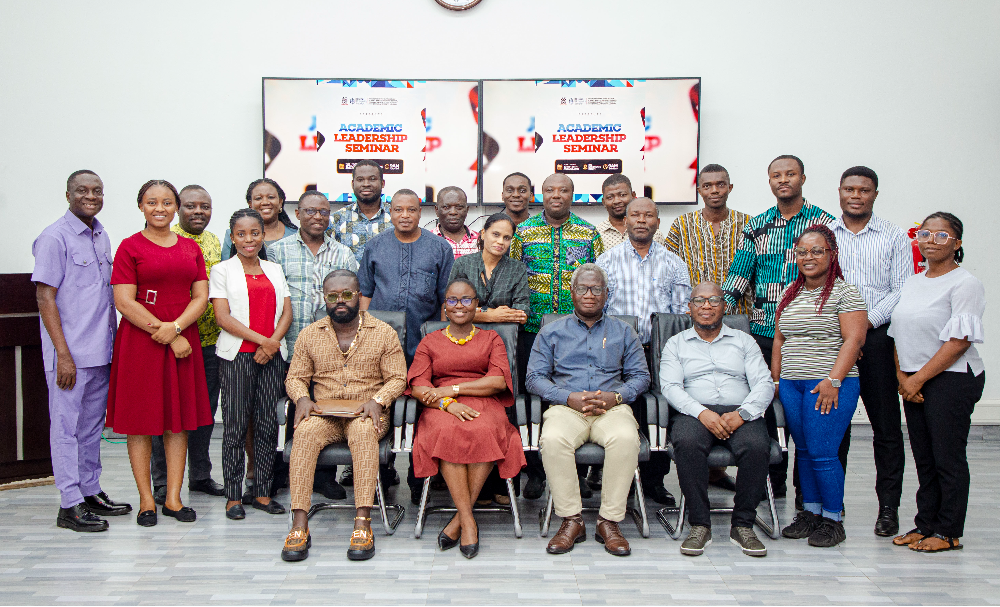Brunel University London has partnered with the School of Public Health at the Kwame Nkrumah University of Science and Technology (KNUST), Ghana, to deliver a three-day academic leadership training programme aimed at boosting research capacity, strengthening leadership, and advancing global collaboration.
The training brought together academic leaders and faculty from both universities to strengthen leadership, enhance research visibility and build long-term partnerships.
It also provided a platform for Brunel scholars to share international best practice and practical strategies for developing stronger research and academic networks.
At its core, the programme stems from the vision of Professor Nana Anokye of Brunel and Professor Peter Agyei-Baffour of KNUST whose collaborative idea gave birth to the training for future academic partnerships.
Brunel’s role in shaping leadership and research
Professor Nana Anokye, Professor of Health Economics at Brunel, highlighted the importance of joint research and co-authored grants in driving impact. He underlined that successful partnerships must be grounded in shared resources and co-publications that increase visibility.
“Joint publications using each other’s data, co-authored grants, and shared academic resources are part of our strategy to increase research impact through this partnership,” he said.
On the final day, Professor Anokye led a session on grantsmanship, encouraging early-career researchers to start small and grow steadily. “Follow the requirements, know your unique selling point, and don’t feel you must always lead a grant application. Start with colleagues, build collaborations and grow from there,” he advised.
He also stressed the value of a deliberate grant-writing trajectory supported by mentorship and careful time management.
Professor Subhash Pokhrel focused on research visibility and academic profiling, noting that high-quality research must be paired with effective communication.
“Producing high-quality research alone is not sufficient; research visibility is a necessary condition to achieve impact. It should be a deliberate, ongoing process that attracts collaboration and amplifies your network,” he said.
Professor Ann Gallagher, joining virtually, presented her “6S Theory” of ethical leadership: Sensitivity, Space, Scholarship, Solidarity, Sustainability and Stories. She argued that these values form the foundation of inclusive, equitable and sustainable academic communities, encouraging participants to balance scholarship with solidarity and inclusion.
Professor Steve Hanney emphasised how research can be designed for real-world influence. He cautioned against publishing without a clear audience and urged researchers to engage directly with policymakers, practitioners and communities.
He also encouraged academics to evaluate the wider impact of their work beyond citation counts, stressing that meaningful success should be measured in terms of real-world change.
KNUST’s focus on mentorship and collaboration
KNUST faculty provided the local context, underscoring the role of mentorship and institutional leadership.
Professor Peter Agyei-Baffour, Dean of the School of Public Health, said the training reflected the vision of the MoU: “One of the main highlights is exchange for staff and students. We want to see bigger grants and new opportunities that benefit both institutions.”
Professor Ellis Owusu-Dabo, former Pro Vice-Chancellor, shared insights on academic leadership, urging participants to value mentorship, collaboration and meticulousness in research. Professor Anthony Adusei, the school’s longest-serving academic, encouraged colleagues to seek meaning and fulfilment in their careers.
Dr Kofi Akohene Mensah stressed the importance of mentorship as “a gift that keeps giving,” advising mentees to respect boundaries, embrace feedback and foster reciprocal learning relationships with mentors.
Participants also heard from Dr. Nadia Tagoe, who spoke on creating and sustaining research collaborations, emphasising intentional effort, trust, transparency and consistent communication.
Looking Ahead
The training, organised by Brunel University of London and the School of Public Health’s Mentorship and Training Committee, highlighted Brunel’s international expertise alongside KNUST’s commitment to mentorship and leadership development.
By combining Brunel’s global research strategies with KNUST’s local leadership strengths, the partnership aims to deliver lasting impact on public health scholarship.
The three-day programme was moderated by Dr. Princess Ruhama Acheampong and Dr. Thomas Agyekum, who guided discussions and reflections throughout. Dr. Acheampong added a local perspective, encouraging academic leaders to cultivate closer, more supportive relationships with students.
“Some may be seeking the father or mother figure they never had. By understanding their challenges and choices, we can better guide and positively impact their lives,” she noted.
Programme coordination and logistics were led by Dr. Shirley Crankson and Ms. Franca Egyaim, ensuring the smooth running of the sessions. Ms. Edith Asravor provided photography and documentation support, capturing the training and producing this report.

















